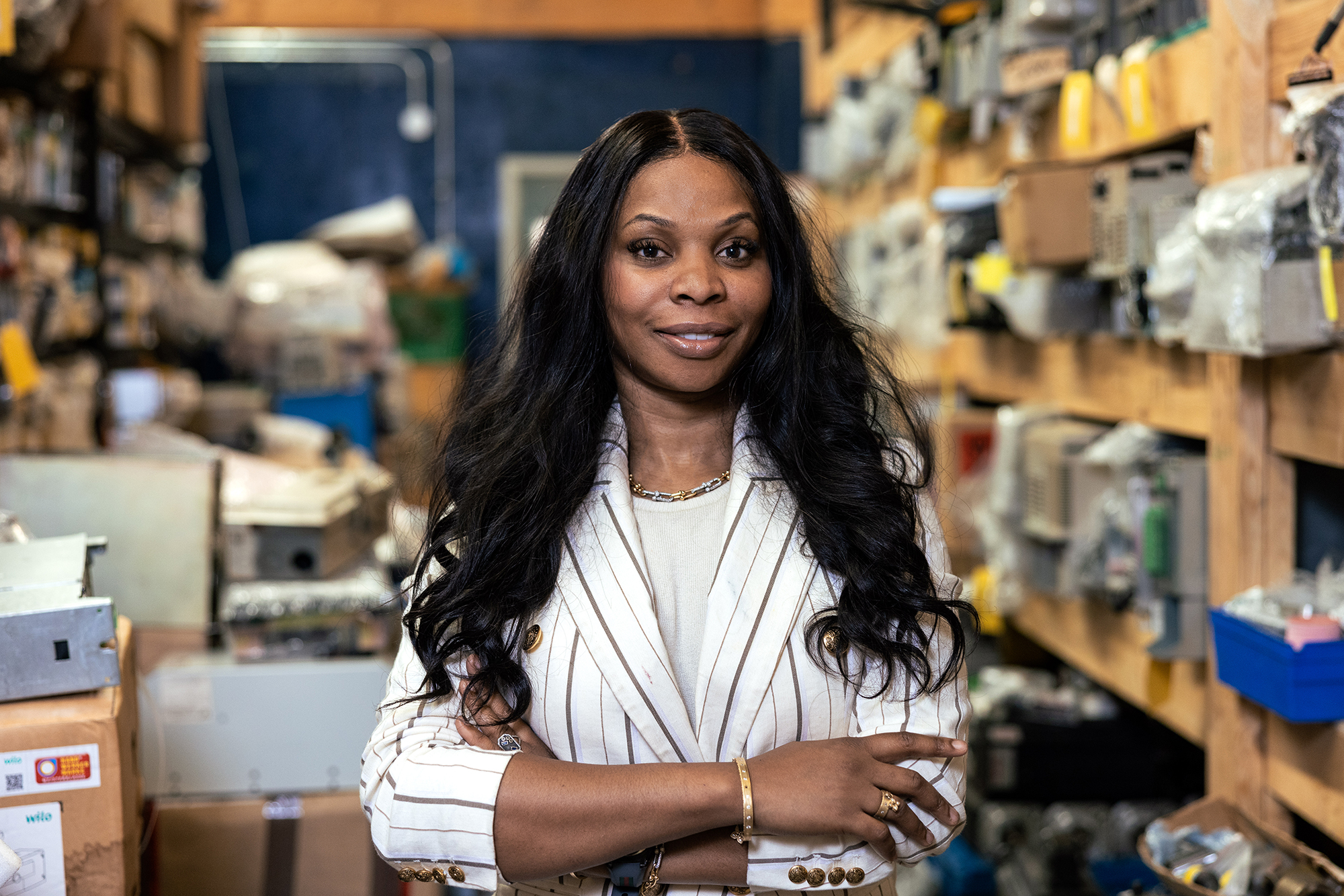
During the height of another Covid lockdown in November 2021, Rachel, who asked to use her first-name only, joined Arbonne—a multi-level marketing company, or MLM, that sells beauty and wellness products like face serums and protein shakes.
The mother of three, who was caring for her five- and three-year-old and her one-year-old baby, had been using Arbonne products for seven years and was a big fan of them. When she got a promo code to sign up as a sales consultant for free—something that usually costs at least US $49—she thought, Why not? The 31-year-old Mississauga, Ont. resident had extended her maternity leave and wasn’t getting paid, so decided to take the plunge into sales in hopes of earning some cash.
“Being on mat leave and socially isolated, it was actually nice to have a way to connect with the community,” she says. She sold most of her products through her existing network, and was also able to connect with other Arbonne salespeople via Facebook groups and Instagram. “It felt like I was doing something for me.”
You might be familiar with MLM content on social media. Video and photos of successful MLM sellers are all over platforms like Instagram and Facebook, frequently posted by attractive 20-somethings lounging under palm trees or 30-something moms posing with smiling toddlers in pristine mansions. Accompanying many of these images is text like: “Be your own boss,” “Work from WiFi,” “Uncapped income potential,” and “Follow your dreams.” Posters declare you can work from anywhere and make your dreams come true if you simply “DM for more info.”
Such messages are a hallmark of MLM companies, where people make money not only by selling products to their social networks, but also by recruiting other salespeople and sometimes getting a slice of their commissions, too. The business model, which has been around for decades—think Mary Kay cosmetics ladies driving door-to-door in pink Cadillacs—is seeing a resurgence in the social media era where it’s easier to shop online, promote products and reach out to potential recruits. A friend from high school no longer has to look you up in a phone book to reach you. It’s as simple as sliding into your direct messages with a “Hey hun!”, trying to sell or convince you to sell things like supplements (Herbalife, Isagenix), essential oils (DoTerra, Young Living) or beauty and wellness products (Arbonne, Beautycounter, Monat).
A record number of Canadians joined MLM companies, also called direct sales businesses, during the pandemic, according to industry data. Tough economic times combined with lockdowns that forced life online created a winning recipe for a business model that pitches predominantly to women—a segment of the population that disproportionately lost work during Covid, according to data from Statistics Canada.
The number of individuals participating in direct sales jumped 20 per cent to 1.39 million in 2020, with sales up 26 per cent to $4.15 billion, according to the Direct Sellers Association (DSA) of Canada’s statistics. That’s about 240,000 new people in an industry made up almost entirely of women (84 per cent). “They saw this as one more way to create a little bit of extra income,” says DSA president Peter Maddox.
There was growth across all age groups—not just the social media savvy younger crowd, says Maddox. He attributes the pandemic revenue boost to salespeople having more flexibility to sell, customers being more willing to support their friends with online shopping to help boost their income, and the fact that many MLM companies sell health-related products at a time when people were looking for ways to stay healthy. And it appears the spike in interest endured into the second year of the pandemic. Based on preliminary numbers for 2021, the number of salespeople dipped from 2020 slightly but revenue held steady, Maddox says.
Many MLM sellers use their existing social media accounts to find customers and new recruits. Younger generations accept that influencers use social media to sell everything from dog accessories to yoga pants to inflatable pools, so aren’t as phased when they see friends promoting products, Maddox says.
But social media can also get the industry in trouble when overzealous sellers make their MLM experience look easily attainable. Anti-MLM communities are growing on platforms including Reddit, TikTok and YouTube, where Gen Z and Millennials post critical takes on these businesses’ pyramid structure. Many videos feature women who have joined MLMs telling their stories about why they left. Others make fun of “boss babes”—a term often used for—and by—women who sell products for MLMs. On TikTok, #AntiMLM videos have more than 341 million views.
In turn, industry groups and MLM businesses are trying to train sellers not to over-promote their experience since the U.S. Federal Trade Commission, or FTC, has become proactive in hammering direct sellers for pushing overstated claims online, Maddox says. His association works with members to educate them on best practices—that they should advertise the average experience that people can actually expect, not the yacht-sailing bliss afforded only to those at the top.
“Even if someone has made enough money from selling a product to travel the world on a yacht—or to own a yacht—that isn’t the average experience”
Public criticism intensified after the September 2021 release of the docuseries LuLaRich, which details the rise of LuLaRoe, an embattled MLM clothing company that skyrocketed to a billion-dollar valuation before founders, DeAnne Stidham, and her husband Mark Stidham, were accused of running a pyramid scheme. Canada’s Competition Bureau defines pyramid selling as a scheme that makes money primarily from recruitment. Participants, who are often lured in with promises of great wealth and financial security, usually pay enrollment or membership fees to join and are then pressured to recruit others, who must recruit others. (LuLaRoe was ordered to pay US $4.75 million by the State of Washington in early 2021 to compensate Washingtonians who were “deceived by LuLaRoe’s business practices” and cover the costs of investigating the conduct.)
On the ground, MLM skepticism is having a material impact. Rachel is finding it hard to grow a team at Arbonne; people are nervous about direct sales right now, she says. So far, she hasn’t recruited anyone, and all her earnings are from the products she sells. Even though she’s back to work full-time as a supply teacher, she still works on Arbonne about three to four hours a week—mostly on social media—and makes about $200 a month, which helps with the grocery bills for her family. She hears comments about how MLMs are pyramid schemes—a characterization she rejects because she’s not making any money from recruiting. Every MLM is different, she says, emphasizing she’s had a great experience thus far.
While some people are evangelical about MLMs and others swear it sent them into debt or ruined their lives, the truth is that the majority of people make little to no money, or even lose money, when they join MLM companies. About a quarter of people who join an MLM make a profit, a quarter break even and nearly half (47 per cent) lose money, according to an AARP Foundation 2018 study.
Most people join MLM companies as a side hustle. Only three to four per cent of Canadian participants work for MLMs more than 30 hours per week, Maddox says. But the allure lies in the messaging from the top one per cent or less who can earn six-figure incomes or more. “Even if someone has made enough money from selling a product to travel the world on a yacht—or to own a yacht—that isn’t the average experience,” Maddox says. “The average experience is people put a few hours a week or a month into it, they maybe earn a few hundred dollars, and that money goes towards their student expenses, their mortgage or a holiday.”
In Canada, MLM companies must disclose what average sellers earn in a year. A scan of 2020 earnings statements for the companies listed earlier reveals the majority makes between $0 and several hundred dollars—and that’s before expenses. Eighty per cent of sellers make less than 10 per cent of their household income from direct selling, according to the DSA. (A typical Arbonne participant in Canada earned between $0 and $300 in 2020 in earnings and commissions, according to Arbonne data.)
So why don’t the stats square with what’s depicted on social media? Largely because there’s immense pressure to showcase only the good online, says Matthew Philp, an assistant professor of marketing at the Ted Rogers School of Management at Toronto Metropolitan University. Social media skews positive because of impression management, which is the attempt to influence how people perceive us by what we portray to the world, he says.
“You see the people that are successful at it. These are the people posting and amassing followers, and they make it seem easy because they’re good at it and they’re making money,” Philp says. “You don’t see the 99 per cent of people that are stuck in their basement and out a couple hundred bucks and struggling. They’re not boasting about that.”
The pandemic posed another problem for MLMs with sellers making claims about Covid. The FTC cracked down on MLM companies that touted products’ ability to prevent the coronavirus, or peoples’ ability to make substantial money during the pandemic. Questionable posts the FTC flagged in its warning letters included, “Got the coronavirus heebeegeebees? Boost your immunity with this amazing deal!!!” Another video stated, “There are a lot of people out there who have lost income … You may want to build a side income, you know, make $500 a month, $1,000 a month or more. There’s no ceiling on this. It’s whatever you want it to be …”
“The pandemic really greased the wheels for MLM operations”
Between April and June 2020, the FTC sent warnings to more than a dozen companies including essential oils company DoTerra, supplement purveyor Pruvit, weight-loss product company Plexus, water filtration maker Enagic, nutritional capsule seller The Juice Plus Company, weight-loss and nutrition company Isagenix and Arbonne. It also went after a now-defunct Canadian organization, BlackOxygen Organics, which sold dirt billed as fulvic acid from “one of the richest peat bogs on the planet” just outside of Ottawa. The FDA advised people in 2021 not to use its “fulvic care powder” and tablets, which the company claimed improved things like brain function and heart health, due to unsafe levels of lead and arsenic in them.
An American industry publication called Social Selling News called the scrutiny by the FTC “unprecedented.” But Canadian MLMs don’t get as much flack as their U.S. counterparts since the rules are somewhat stricter here and complaints to consumer groups are more rare. Unlike in the U.S., companies need Health Canada’s pre-approval to sell nutritional products. Plus it’s illegal for sellers to get paid for recruiting. (They can get a slice of their recruits’ sales, but an actual product needs to be sold.) As such, industry players get frustrated about the bad press largely from the U.S., Maddox says.
Regardless of the criticism flare-up—in both traditional media like documentaries and news articles and on social media—MLM isn’t new, nor is it that different from what it’s always been. Companies today use the same old business model, social media is just changing the way people interact with these brands, says Ken Wong, an associate professor at Smith School of Business at Queen’s University.
While a claim that a hair product or nutritional supplement will change your life may happen on Instagram, it’s no different than what used to be pitched at conferences and parties, says Wong. (In high school he sold cleaning supplies door-to-door for an MLM company and his mother was a part-time Avon sales rep.) Instead, Wong credits economic hard times for encouraging people to flock to MLMs to supplement their incomes. “The pandemic really greased the wheels for MLM operations,” Wong says, adding that government payments to people who lost their jobs were helpful for the industry.
Wong says multi-level marketing is a chance to make a little money for companies that are above board. But the industry has a bad rep given the troubles faced by the vast majority of sellers at the bottom of the pyramid who are sold an opportunity they likely can’t achieve.
Thea*, who asked to use a pseudonym to protect her identify, spent the past decade getting to know the MLM business as a direct seller. Contrary to the trend, the pandemic was what inspired her to leave. The 48-year-old Toronto resident joined Arbonne in 2011. At the time, she was a cash-strapped single mother with a young daughter. Instagram was growing in popularity as a photo-sharing app, but it wasn’t the product-promoting machine it is today. So Thea grew her business the old-fashioned way: by approaching hundreds of people in real life, from baristas to young women in line at Whole Foods.
She was good at it, too: In her best year, she made about $40,000, predominantly from commissions from her Arbonne recruits. By then, her team had grown to about 200 people. She reached the company’s second highest tier—only three per cent of salespeople make it that far, according to the company’s consultant earnings statement—and in 2016, qualified for the award of monthly payments for a white Mercedes-Benz. (The lease is in the salesperson’s name, but Arbonne awards cash to pay the bills.) Her confidence soared.
Even though it wasn’t a traditional nine-to-five job, Thea was consumed by the work. She believed so much in the company and the potential to make serious cash while being her own boss, she says, that she “worked her butt off” and made sacrifices, like time with her daughter, to try to reach the top. She wasn’t duped into joining, she says, but feels like she was misled by the internal messaging from the company and other sellers to work harder for your kids, for your future, for your freedom. Plus she felt like she had to make Arbonne work. Thea hadn’t pursued a career after school, focusing instead on motherhood. She didn’t have anything else to fall back on.
She started feeling disenchanted with the business model around 2018. Her business was slowing down as she found it harder to recruit, and she no longer qualified for the bonus payments for the Mercedes every month. When she didn’t, she was stuck with a monthly bill of about $500 for a vehicle she couldn’t really afford because she didn’t want to take the larger financial hit from getting out of the lease.
When the pandemic hit in 2020, combined with the U.S. election, some of Arbonne’s star salespeople started sharing QAnon conspiracy theories, as reported by the Atlantic, on their extremely popular Facebook pages. Thea wasn’t sure she wanted to be associated with the company.
“When we went into lockdown, you had time to think and re-evaluate things. I was like, ‘Do I see myself doing this for the rest of my life?’” she says. Her hard work wasn’t getting results anymore, and she was insulted when the higher ups repeated that success was based on effort. “The fact that you’re telling me that I’m not successful or I’m losing success because I’m basically lazy? No. I worked hard.”
Thea quit in December 2020. Most friends were supportive, but some former colleagues criticized her for speaking negatively after “everything the company had done” for her. Others told her not to judge the whole company based on the small group of women. But she knew she had to get out. She worked so hard and gave up so much of her time, and after nearly a decade, had little to show for it. She’s since enrolled in a post-secondary course and plans to pursue another career. For anyone thinking about joining a MLM company, her advice would be don’t do it.
“As cliche as it is,” she says, “if it sounds too good to be true, it probably is.”









